ROBERT
ERNEST DAVIES
|
Born
Melbourne
4 July 1921 |
|
Father
Ernest Davies (deceased 1927) |
|
Mother
Helen Terese (nee Shapira) (deceased 1953) |
|
Siblings
John Dowell |
|
Frances
Alison |
|
Shirley
Helen (deceased 1975) |
* * *** ***
************ *** ******* * ****
EARLY DAYS
Following
the death of our father, the family moved to Daylesford (Vic). It being in the
middle of the so-called Great Depression and in the absence of a Widows Pension,
our mother was obliged to earn a living. She opened a small shop (morning and
afternoon teas and confectionery etc) from which she scratched out a living
while the four kids went to local schools.
In 1930, the
family went back to Melbourne and lived in a succession of rented houses, mostly
in the southern suburbs of Melbourne. Often our stay in a house was of very
short duration, as it was necessary to chase cheaper rental I believe. Both John
(Jack) and I attended Melbourne Boys High School while Frances and Shirley (the
twins) went to Prahran Technical School.
Jack having
matriculated, studied Accountancy part-time whilst working with various firms in
Melbourne. The twins each became Nurses at the Alfred Hospital in Melbourne,
each completing the three year course of training.
AFTER SCHOOL
I
matriculated at the end of what is now known as 11th year, which was the usual
thing in those days. On leaving school I took a job as a Junior Clerk with a
branch of Imperial Chemicals Ltd and stayed with them until the start of the
second World War.
One of the
conditions of employment was that one should study Accountancy part-time so I
started the course with the objective of completing it in five years. However,
after three years, the War started. I was then 18 years of age and could not
enlist for overseas service without the written consent of my Mother so decided
to join the militia for full time service --- this was for service in Australia
only and did not require consent. I spent almost a year in this way and became a
corporal and then a sergeant. It was made clear to me that if I joined for
overseas service, I would be given a commission so went to the appropriate place
and signed up, putting my age up to 21 which meant that my mothers signature
wasn�t needed.
SECOND A.I.F
 |
At this stage there was
rapid expansion of the Second AIF and they weren�t being too fussy about
written consent etc. So after a week or two, I was commissioned as a
Lieutenant and put on the fast track for movement to the Middle East, We
travelled in comparative luxury in the 85000 ton Queen
Mary. The next two years saw me in what was then known as Palestine,
Egypt, Syria and the Lebanon. Four months after the Japs entered the war,
our units were shipped back to Australia.
|
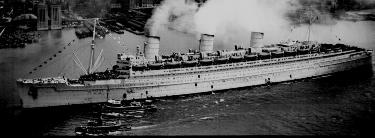 |
|
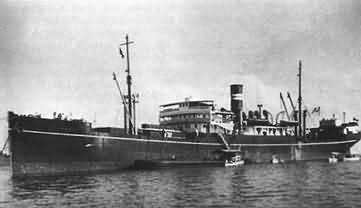
|
I travelled back in a 6000 ton tramp ship and was lucky enough to be
stranded for a month in a small port name Cochin in Southern India because
the ship didn�t have enough coal to get back to Australia. This time our
ship was a little old coal burner from the British-India Line (SS
GARMULA). Top speed 8 knots and only 40 troops aboard. After our coal
arrived, we sailed for Fremantle -- or so we thought. The plan was that we
should be rapidly sent to Darwin as it was thought that the Japs would
invade from that direction. |
After a very
slow voyage back to Australia, mainly due to bad weather, we arrived in
Fremantle to find that we really weren�t expected as wed been so long out of
touch --- the dear old Army more or less thought that wed come to a sticky end.
There was
considerable messing about and changes of plan before the decision was made to
send our Brigade group to Darwin. And there we stayed for about 7 months. There
were a few air raids during that time but none of our crowd were hit.
| During that time I was detached from my own unit and
loaned to an Infantry Brigade Headquarters as a Liaison Officer --- not a
bad job and my own unit was only about twelve miles up the road so I
wasn�t too far away from my mates. Part of my duties as Liaison Officer
meant that I was the contact man between HQ 19th Brigade and a Beaufighter
squadron operating from a field named Coomalleigh
Creek, about 30 miles south of Darwin. One of the flight commanders
was an old school mate (Don Rose) who on finding I�d never been up in an
aircraft decided to rectify the matter. This aircraft had a crew of two
only, so for my illicit flight, I had to go in through the hatch in the
floor then once that was closed, stand on it and hang on to the back of
the pilot�s seat. My several flights were searchlight co-operation
flights over Darwin and the major problem was that there was no way in
which the illegal passenger could be supplied with oxygen if we went above
about 10,000 feet. Don thought this over and told me that if I felt at all
crook, just punch him on the arm --- all very scientific. I survived! |
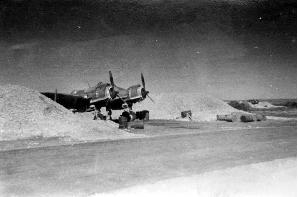
A 31 Squadron Beaufighter at Coomalie field |
 |
At the end of my stay in Darwin, I was sent to the
RAAF School of Army Cooperation in Canberra to spend six weeks learning
how to be an Air Liaison Officer. Quite good really --- 10 Army officers
and 10 pilots all of whom had been in the Middle East. Lectures every
morning then in the afternoons we�d do various training exercises flying
around the general area in Wirraways |
| Then to the Atherton Tableland in North Queensland
where I confidently thought I�d be sent to a job as an Air Liaison
Officer. However that�s not the way the Army works and I was given a
temporary job as Liaison with a new Brigade Group which had been formed to
accommodate the two Militia battalions which had done a fantastic job in
belting the Japs on the Kokoda
Track. Really the purpose of the exercise was to teach them how to put
up with the bulls--t they�d now have to comply with now they were AIF
units. Those guys were real soldiers. In time, of course I had to return
to my parent unit in time to go to New Guinea with them. |
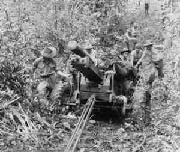 |
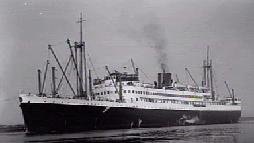 |
So--- aboard the troopship DUNTROON and off to the
north coast of New Guinea to scramble down cargo nets hanging down the
side of the ship to get into small barges to be taken ashore. Our Division
was in action in the 100 mile stretch between Aitape
and Wewak with the very tall Torricelli Mountains making life
difficult. However the Army used its loaf for once and I was posted to a
RAAF supply dropping unit as its Liaison Officer. I enjoyed this and used
to fly most days with the �biscuit bombers� assisting with the
navigation. However the fickle finger of fate awaited me!! |
About a year
before this, the British Army asked the Australian Government to let it have
1000 officers of the rank of lieutenant or captain, with jungle experience, to
be discharged from the AIF and re-enlisted in the British Army for service in
Burma. Our people said no way to 1000 but you can have 200. 1 think that at that
time (late 1944) nearly every young officer applied --- including me. As the
months went by, nothing happened except all of us had to front up to War Office
Selection Boards Deafening silence followed.
One night,
down at a place called Cape
Wom where we were actually engaged with the Japs, I received a signal from
our Divisional HQ to make my way back to Aitape and arrange with the RAAF to fly
me back to Australia for early movement to India. I WAS TO MAKE ALL MY OWN
ARRANGEMENTS
There was an
American landing ship unloading stores offshore so I went down and virtually
thumbed a ride back to Aitape and organised with the RAAF to fly me back to
Sydney -- all very unofficial, of course.
During my couple of days
in Aitape, I remembered that my Mother had told me in a letter that one
Lila Rowley was now serving in New Guinea with 2/11 AGH.
|
Enquiries
revealed that 2/11 AGH was in Aitape, so I phoned the SISTERS� Mess and
arranged to meet the lady in question and that evening, visited her in the Mess.
I had met her before the War when both she and my sisters were at the Alfred
Hospital and as a countyi girl she had been invited to our home for a decent
feed as a break from hospital tucker. So I met up with her and in the next few
days made the long air journey Aitape / Merauke / Port Moresby / Cairns /
Charleville / Alice Springs / Adelaide / Sydney / Melbourne. Only the mental
giants who controlled troop movements could tell you why it was such a round
about trip!
Anyway,
needless to say Lila features prominently in this story.
|
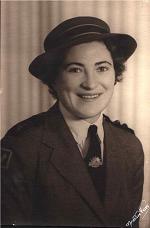 |
THE BRITISH ARMY
| The 180 of us who had been selected to go
to the British Army were divided into groups of about 20 and put aboard
various ships --- the war was still on and the Brits didn�t want to lose
the lot of us in the event of the Japs sinking ships.
My group of 20 embarked in Sydney aboard the Royal
Navy aircraft carrier HMS
Begum and sailed to Thursday Island where we picked up some Fleet Air
Arm pilots arid thence to the big British naval base at Trincomalee
in Ceylon (now Sri Lanka). |
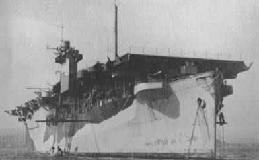
The HMS Begum riding at anchor |
We then
commenced a pantomime of amazing proportions! Nobody knew who we were, nobody
knew us and nobody wanted to know us. HMS Begum had to sail so we were put
ashore and were billeted with a Royal Engineer Smoke unit, whose purpose in life
was for someone to press Button B if the Japs turned on an air raid and cover
the naval base with smoke. As the war ended a few days after our arrival, we
didn�t see this performance. However we didn�t escape from the smoke unit
and had to stay with them for about ten days.
Nobody knew
who we were, where we were going. �-not a thing about us.
We started
off on a wandering path --- our needs were simple ---- we just wanted someone to
love us! We went by train to a town in the middle of Ceylon and found that all
towns on this island had a thing called a Guest House where travellers could
stay for a couple of nights and get a bed and a few meals. After that we went to
Colombo where the procedure was repeated. Three days there and then onto another
train to the other side of the island and after bedding down in another Guest
House, we took a ferry to the southernmost tip of India (Talimanar) then by
train to Madras. Another Guest House then train to Calcutta, same again to
Ranchi , again to Lohargarhga, same again to Poona. By now the war had been over
for two and a half months !
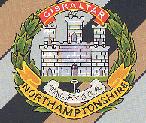 |
How
did we live? The British officer is a privileged being and wanderers like
us could obtain a bed and breakfast on request at any Army establishment.
Money??? No problem -- simply go into any branch of the Hong Kong and
Shanghai Bank, produce your ID and get a small advance on your pay. So we
survived. We eventually ran into a reasonably intelligent Colonel in an
officers� mess one day who said he could fix our problem. Which he did
and together with four of my mates we finished up in Poona, of all places.
Eventually the five of us were commissioned into the Northamptonshire
Regiment (the FortyEighth of Foot). The dear old British Army does not
commission people into the ARMY as such, but rather into a specific
Regiment. By this time I had been a Captain in the AIF and the Brits
decided that I should become a Major forthwith.
|
So. I became
a Rifle Company Commander in a Regular British battalion.
Two months
after this the Japs threw in the towel. Either they had learned that Davies,
Batters, Moore, Phillips and Nicholls had arrived in Asia or maybe it had
something to do with the fact that the Yanks had dropped the first atom bomb a
week or so later. Whatever the cause, Japan decided to give the game away. The
War Office decided to send our battalion plus two Scots Regiments to what was
then called Malaya. We travelled from Mumbai (then called Bombay) in great
luxury in a very large ship which had been built for the South American meat
trade. Every part of it was refrigerated and as we were travelling to Singapore
virtually along the Equator. We had a great voyage.
In Singapore
we disembarked, and my Company (A Company) of 105 soldiers travelled in a tiny
clapped out troopship up the east coast of Malaya to a smallish resort town
named Mersing. (any time
you are in our house at Hervey Bay, look in my study and you will see a painting
of the mouth of the Mersing River with all the native huts and boats). A Company
loved Mersing.
We had a bit
less than 1200 Japs to look after as they were now our prisoners. They were
extremely well behaved. The news had now broken about the ill-treatment of the
Australian and English POW�s and I think that our prisoners were determined to
be good boys. We put them on to jobs like cleaning out the gutters in the town,
digging up mines that they had buried in the beach sand (!!) and the more
enterprising of my lads gave them useful jobs to keep them out of mischief.
Several times I went into our soldiers� sleeping quarters to find a Jap
sitting on a charpoy (Indian for bunk) cleaning a soldier�s Bren gun.
A Company
stayed at Mersing while the remainder of the Battalion were located in
Singapore, doing guards of Honour for Admiral Lord Louis Mountbatten or policing
the curfew or generally standing guard at the War Crimes trials.
After three
months we went down to Singapore and joined the rest of the 48th of Foot in
Gillman Barracks which had been built by the Brits just before the war --- very
comfortable. We joined in the Depot Battalion work with the rest of the mob.
We were sent
on a few days leave to a little island (Palang Bakan Mati) in the middle of
Singapore Island which was by way of being a rest camp. (Years later Lila and I
visited this island -- now under its new name � Sentosa -- during a short stop
off in Singapore on our way to Greece.
So we
alternated between garrison work in Singapore, exercises in the beautiful
Cameron Highlands at an altitude of 3000 feet and a spell in Kuala Lumpur.
A DECISION TO BE MADE
About the
end of 1946. we Aussies were invited to apply for regular commissions with the
Brits and while pondering over this I received a letter from Brother Jack to
tell me of a plan the Australian Government had to finance returned soldiers who
had enlisted while under the age of 21 and had served overseas, to do University
courses . GREAT ! One big problem however I had falsified my age on enlistment
and by my AIF records had been older than 21 when I joined up in 1941. However,
back to Melbourne attired in a British Army uniform with all the trimmings, I
went into an Army Records office in Lonsdale St, expecting to get into all sorts
of strife. However--no drama. I approached an elderly Warrant Officer and asked
how did I go about altering my enlistment age. There were so many young blokes
in the same situation that the Army had designed a special form . (�Just fill
in this form and You�ll be right, mate�).
So in spite
of my beautiful uniform, I was in no army at all and was able to go ahead and
apply to Melbourne university to do a Medical course. There were a few hurdles.
Had to go back to school for a year and do Matric. Chemistry, Physics and Maths
at Taylors
Coaching College (aka the Poor Man�s University). So that�s what I did
the year after stopped being a soldier, taking the odd job here and there to
supplement the smallish weekly allowance that the generous people in Canberra
gave us.
A STUDENT
While
waiting to get down to the business of starting my Medical course, there were
certain things to do.
- earn a few pounds. Despite the
tens of thousands being demobilised, there were stacks of jobs. I spent six
months checking invoices at the Commonwealth Dep. of Supply and Shipping in
Melbourne.
- Next Year --off to the Poor
Man�s University (George Taylor & Staff) to study Matric Chemistry and
Physics --- subjects I had not taken at school and which were essential to
get in to the Med. course.
MEDICAL SCHOOL
There were
huge numbers of ex-service people wanting to study Medicine and only three Med.
Schools in Australia (Melbourne. Sydney and Adelaide). With rare genius, the
Melbourne School decided to take over the now disused RAAF Flying School at
Mildura and convert it into a Branch University for first year Medicine,
Dentistry and Engineering. Hangars were converted to lecture theatres and
Laboratories while the troops barracks became two person flats for students. All
first year students were compelled to do their year 450 miles away from home and
all distractions. There was a 50% --50% mix of ex-service people and young
people straight from school. Despite all the gloomy forebodings, this was a
brilliant success and was copied in other parts of the world.
The
Commonwealth Government paid all fees, book costs, rail fares to and from and
board and food. Each student was given five pounds (ten dollars) per week for
general expenses. This was a gift for the first three years after that had to be
repaid. Medicine being a six year course meant a fair size debt on graduation,
Nobody worried at the thought of that. If you failed a year. you were OUT! A
great incentive to study --- if you were tossed out at the end of five years,
you were totally useless!
BUT IN THE MEANTIME�
|
Remember
that Lila Rowley I mentioned earlier? She had now returned from the
Pacific Islands where she was serving in the Army and like so many troops
in those times came back to Australia harboring various tropical diseases
and for quite a while either worked at, or was a patient in, the
Heidelberg Military Hospital.
As a
fairly new civilian, before heading for Mildura, I had been living at
Ivanhoe -just up the road - at my Mother�s home (actually the house
belonged to brother Jack). I think that Lila will be telling you some
important details when she is writing her story. She will doubtless fill
you in on the steps by which two Returned Soldiers decided to get married
on a combined income of about 20 dollars a week and five years study ahead
of me.
|
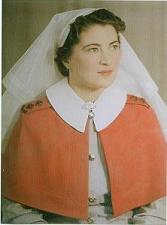 |
 |
We were
married at Christ Church, South Yarra, (where as a school child I sang in the
choir!) on 23 February 1949 and for the first few months lived with my Mother.
With our combined deferred pay from the Army we bought a block of land at
Rosanna 6 miles from Melbourne GPO. Cost us two hundred pounds. Our three
bedroom house was to cost us two thousand pounds !
|
 |
No washing
machine (too dear) but the copper could be boiled up when needed. And of course
the copper was most useful on those rare occasions when a crayfish came our way.
Not kind, I know but a great way to get a Cray ready for eating. We didn�t
have a refrigerator either - also too dear. However once each week the ice man
came --- aka Bacteria Bill: he would shove a block of ice into the ice chest.
On the other
hand the grocer would call at the front door one morning each week and later in
the day would deliver the order. We kept chooks in the back yard and collected
the eggs and could eat one every so often but once the chooks were given human
names that little practice lost its charm. We grew our own vegetables, which was
good.
To
supplement our allowance, Lila did some nursing from time to time at the Repat.
Hospital and at other times assisted the pharmacist in the local village. During
University vacations, I�d take jobs -- one time working on the assembly line
building Mickey Mouse radios but mostly working at the Rosella Tomato Soup
factory giving some clerical assistance to the bloke responsible for buying all
the fruit.
Employees
could walk through the factory eating as much fruit as they wanted and could buy
damaged cans of fruit or soup for next to nothing. If there were no damaged
tins, the lads would damned soon damage some for you. No fun, I assure you
carrying a box of a dozen tins of curried spaghetti up the Rosanna Hill to our
house. It wasn�t just the hill -- it was from the factory to the Richmond
station, then change trains at Victoria Park (complete with the dozen cans) ,
get out at Rosanna then up the quite steep hill to the house. Any wonder I
can�t eat curried spaghetti?
 |
By now you
will have figured out that we didn�t have a car -- in fact such did not
eventuate until we had been married for five years. A little red Morris Minor
with a fold down hood -- secondhand needless to say, but greatly loved. |
Finally the
time came for my final exams and right in the middle of them, my Mother died
which didn�t help much. This was quite unexpected. Then just before the
Conferring of Degrees, the beautiful Wilson Hall burned to the ground and our
grand ceremonial was transferred to the Union Theatre -- not an impressive
venue, so that was the second disappointment. I asked Lila�s Mother if she
would like to attend in place of my, Mother and to my great pleasure, she said
that she would be honoured. That was on a Saturday afternoon and on the Monday,
I visited the Medical Board and signed the Register and so became a legally
qualified and registered Medical Practitioner. To complete the procedure, I was
then advised that I had been appointed to the Royal Melbourne Hospital which was
exactly what I wanted.
| During my 12
months as an RMO, one of the Senior Physicians (Bill King) asked me was it true
that we wanted to go to country town to practise and advised me to spend the
next year working in a suburban group practice with a boss who could be of great
value rounding off what I�d learned at RMH and the Children�s and Women�s
Hospitals. So the next year was spent working with and under a great man named
Frank Bacon, who not only was an excellent practitioner but also a superb
teacher. Fortunately; the practice was not very far from where we lived so not
too much time was spent in travelling. It was during this twelve month period
that Peter Robert put in an appearance so that when at the end of the year, we
were ready to go bush, we were a family.. |
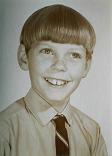 |
So, at the
start of 1958, four of us arrived in Tongala to take over the practice. (FOUR
??? yes, we took the family cat with us.) I was the only medico in the town --
population about 2500 but with all the ex-service people making up for lost
time, the birth rate was spectacular and I used to preside over the birth of
about 130 babies annually. Car radios had not been invented and the mobile phone
was about 20 years away. Once I went off on a home visit or to a hospital in
another town, Lila was faced with a problem if I was wanted in a hurry for any
reason. However, our phone system was in the pre-automatic era being what was
known as the �wind-and-wait� type. For the doctor�s wife to find out where
the doctor had gone, she�d wind the handle on the antique device and when the
operator replied, ask where the last phone call for the doctor had come from. She
would then phone that number and if I�d left there, the householder would know
where I�d headed for on leaving. Very efficient.
| During the
ten years that we stayed in Tongala (known to the locals as �Tonnie�, of
course) we built a new surgery and a new house and Graeme and Ian arrived to
join the family. We made a number of car trips south to visit both the Rowley
and Davies families. These excursions were made difficult because (a) I always
had to get a locum to mind the shop when I was away and that was never simple
until the Base Hospital at Mooroopna decided to make Resident Medical Officers
available for weekends (at a fee) so that the solo practitioner could get a bit
of a break. Medically they were satisfactory but there were problems ---- we had
one Chinese bloke who used to clean his teeth at the kitchen sink which involved
much spitting (Lila did NOT approve). Another one -- an enormous Italian bloke
--- we booked into the local pub for the weekend where he was notable because at
something over 20 stone, he was so heavy that he broke the toilet seat. |
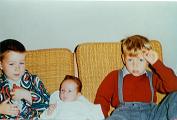 |
The second
difficulty was that in those far-off days, it was illegal for service stations
to sell petrol between 6pm Friday and 6am Monday which meant having to carry
cans of petrol in the boot with the luggage � not really desirable.
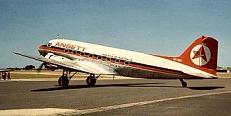 |
We did have
one holiday in a seaside flat at Cronulla in Sydney � big adventure �we flew
from Melbourne in a dear old DC3. The kids enjoyed the beach but Peter became a
bit upset that the prawns and fish were really dead!!! A bit strange for the
keen fisherman he eventually became. |
I still
believe that 10 years in a solo country practice really completes medical
education.
It had its
moments though. We had no Blood Bank of course and if I wanted blood for a
patient they would put it on the evening train from Melbourne which came in at
9.30 pm so when I heard it blow its whistle at the level crossing up the road,
I�d jump into the car and head for the railway station. Before being able to
give the blood to the victim, it was necessary to cross-match the donor blood
and the recipient blood. No lab. closer than Mooroopna and that didn�t operate
at night so I did it myself using a Mickey Mouse device I�d obtained from the
US, fully aware of the fact that if anything went wrong, I�d be crucified by
the Medical Board.
After a few
years, I decided to speed the business up and by now being President of the
local RSL and being much better known, was able to obtain the blood groups of
all the Old Diggers and would call on one or another of them to donate blood for
immediate use -- after my primitive cross-matching ,of course. All of this
business had its lighter moments of course. One night I was confronted by a
woman who needed a transfusion quickly; I consulted the list of donors that I
always carried in my bag and phoned one Kevin Kelly, one of my old soldiers and
told him to come to the local hospital pronto --took a pint from him into a
bottle and immediately transfused the patient before we operated on her. Next
morning, Kevin phoned the hospital and enquired �how�s Mrs X�. The Sister
asked are you a relative to which Kevin replied
�no, I just want to know how she is ----I gave the blood last night and
I�d been on the grog all day and I was afraid she might have a hangover this
morning !!
There�s a
limit to how much of that sort of thing one can stand so we decided 10 years was
enough. Our next move was to Sydney and I�ll tell you more of that when you
reach the section headed �HOMES�.
HOMES
In a way it
is not surprising that we�ve moved around quite a lot and have lived in quite
a number of places since we�ve been married. As Lila has written, she came
from a family that didn�t move away from the Mornington Peninsula. On the
other hand, after the death of my father when I was very young, we lived very
much like gypsies, moving from house to house where the rent was cheaper and
where my mother could eke out a crust, to support her four kids. (Keep in mind
that there was no widow�s pension in those pre World War II days).
So, for a
start, Lila and I shared my mother�s house in Ivanhoe (except it actually
belonged to my brother Jack !)
As service
people, returned from overseas service, we could avail ourselves of a low
interest loan for housing purposes ---- we did this as mentioned earlier, and
had a small house built in Rosanna, about 10 km from the centre of Melbourne,
but actually then the absolute outskirts of the metropolis. And there we stayed
until I had finished my medical course six years later. As we had decided that I
would go into a country practice, about eight years after our marriage, we sold
that house and moved to Tongala (140 miles away) accompanied by our family cat
and Peter who had by this time, put in an appearance. In Tongala, for the first
few years we lived in a house that we rented from the local hospital ---- fairly
basic --- outside toilet which for the first few years was serviced by the
�nightcart man� but after a while the hospital committee decided to install
a septic tank. Some years later, we bought quite a large area on the fringe of
the township and engaged a local builder to build a house designed by an
architect (in retrospect he was a bit of a bushranger). We had farms alongside
and Peter (and Graeme and Ian who had arrived on the scene), could be quite
interested in the cows and calves next door. Television had just come to
Australia in time for the 1956 Olympic Games and we had installed a 130 steel
mast with 30 feet of antennas on the top, with which we could watch the
primitive TV programmes from Melbourne. Tthere was a regional station in
Shepparton (about 60 miles away) but its programmes were lousy.
Anyway, the
TV didn�t matter much because in a severe storm, the mast was blown down and
it almost looked as if an aircraft had landed in the paddock!
The time
came to move on � I think mainly because of the demands of a solo one-man
practice in a country town. It wasn�t tough only for the doctor, as the
doctor�s wife had a hell of a job trying to keep the practice running while
her husband was tearing around the countryside after his patients AND at the
same time looking after three little boys.
From this
�one man town� we moved to Sydney. And what a change that was! We had
managed to sell the Tongala house and now, again with the aid of the War Service
Homes Commission, we bought a house in Rose Bay. Couldn�t see the sea from the
house but from the front gate (with a hit of imagination) you could see a hint
of water.
| One of the
big thrills of that place was the fact the flying boats used to moor on the
water just down the road a bit and every day or so one would take off to fly to
Lord Howe Island. We all learned to sail (after a fashion). Lila, Peter and I
sailed a 16 foot Corsair yacht while the two little boys sailed a 8 foot Manly
Junior ---- with absolutely no success in races, need I say. After a while we
bought a small motor boat and did some exploring of Sydney Harbour. Actually we
did a lot of exploring of Sydney and its surroundings and finished up knowing a
lot more about the Harbour City than a lot of the locals. |
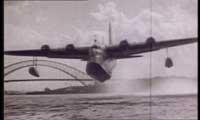 |
 |
We had a few
modifications made to the house to make it more suited to our family. The three
boys all went to Cranbrook School which wasn�t far from the house but entailed
a short bus trip which was regarded as a big adventure.
|
 |
 |
I had gone
completely away from running a practice and took a job as Deputy Medical
Secretary of the Australian Medical Association in New South Wales. To keep my
hand in medically I used to spend every fourth weekend working on the Eastern
Suburbs Emergency Medical Service which covered the King�s Cross area and one
used to see life in the raw. Paid well, however.
In some
respects, it was a bit of a mistake to spend four years in what was virtually a
medical administrative job, however it did broaden my experience of the medical
world in Australia because in country practice in Victoria, I was in many
respects very isolated.
One of the
medical couples with whom I became friendly were on the wrong side of 70 and
after being in rural general practice had gone into the more or less infant
specialty of Occupational Medicine. One day, Naomi --the female member of the
couple- asked me if I�d ever thought of doing likewise and after a few long
discussions with me, told me that the job of Chief Medical Officer at ICI
Australia was coming up and said that she thought I should apply for it. It
would mean a move back to Melbourne but that wouldn�t matter.
I put in a
written application as did a number of other people and after a while was
invited to go to Melbourne where the Head Office was. Met some of the Directors
and had to answer all sorts of questions. About a week later I received a letter
offering me the job and setting out what was the offer.
For a while
I wondered if Naomi had some sort of pull with some of the Directors but
probably they were interested in the fact that I�d been a GP in a farming area
and so was familiar with some of the chemicals being used by the patients.
Whatever the reason we now had yet another house to sell and to up-anchor and
make another interstate move.
| As the new
job was Melbourne-based this meant a move back to Victoria and some changes to
be faced. Our house was about 2 km from the sea and 1 km from the railway. Each
day, the boys went to and from school per bus which picked them up more or less
at the front door. The new school (Brighton Grammar) was not as up-market as
Cranbrook had been for which we were quite grateful. Having been introduced to
Rugby in Sydney, the boys now had to become accustomed to Australian Rules. |
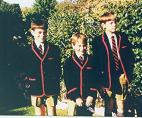 |
A big
advantage was that Sandringham was a convenient starting point on the way to
Rye, where the Rowley family lived, and trips to the Mornington Peninsula were
no longer a rarity.
So before
long our larger family, Lila, Peter, Graeme, Ian, Jason (a little dog) a black
and white cat which answered to various names and a stowaway blue budgie, lived
at 100 Abbott St. Sandringham. As my new job necessitated quite a lot of travel,
I was by way of being something of an intermittent boarder.
My sister
Shirley (another wartime Army nurse) died in her own hospital after a long
illness. Lila�s brother, Des, died far too young, leaving a young family.
Uncle Jack�s wife (Betty --- another nurse) died after a long illness as did
Lila�s sister, Alma. Lila�s father {Grandfather Rowley} had long since left
us, having died before we left Tongala whilst the very small Grandma Rowley
passed on during our stay in Melbourne.
So ---
although life in our new environment had its good points, the extended family
was having its bad times.
Our three
boys were having changes to life style. Graeme joined the Royal Australian Air
Force as an Apprentice Armament Fitter at age 15, which necessitated leaving
home, of course. Peter elected to leave Brighton Grammar and transfer to
Sandringham Tech. and from there to various jobs before buying some land near
Casino in NSW. Where he is at the present time. He gave us our first daughter
when he married Lvnne.
 |
Ian stayed
at Brighton Grammar and matriculated there, then proceeding to R.M.I T. where he
obtained a degree in Computer Science. During our last six months or so in
Melbourne, Ian moved to an apartment in Elwood which we had purchased and which
he subsequently bought from us. |
While all of
this was going on. the nature of my job at ICI changed markedly in the area of
Occupational Medicine in the Chemical Industry. My work was now almost entirely
involved in Toxicology ---virtually a new science. A good challenge!! The reason
that it was challenge was simply because at that time there were no courses in
the topic available in Australia and one more or less picked it up by osmosis. I
was fortunate that I now belonged to a world-wide organisation which was able to
put me on the right track.
The timing
was superb because almost coincident with my arrival, the company had to face up
to major problems affecting people in the factory, the field and the
environment.
THE PACIFIC ISLANDS
When I
joined ICI Australia as its Chief Medical Officer in 1970, the job really was
like an Army First Aid post than anything of greater importance. If any of the
hierarchy developed painful haemorrhoids or suchlike, the customary thing was to
get the Company CMO to offer comfort or whatever seemed appropriate.
Actually
this was not in keeping with modern thinking as regards occupational medicine as
it had become to be known. However, times they were achangin� as a popular
song said.
In the
chemical industry, new challenges were cropping up. For example, workers who
manufactured blasting explosives were suddenly found to be liable to have fatal
coronaries on Monday mornings!! But on no other days. Workers who were using a
chemical known as vinyl chloride monomer were found to be developing a very
malignant liver cancer called angiosarcoma of the liver. Why?? People in the
paint industry were found to be dying of curious failure of the respiratory
system. Why??
The
Agricultural Industry was the area where factory workers and field workers alike
were having major health problems and it must be remembered that this was very
soon after the Vietnam War with the memories of Agent Orange etc.
Our parent
Company (Imperial Chemical Industries UK) realised that things were going
haywire and decided that it should tackle the situation head-on. They owned and
operated the world�s largest non-government toxicology research labs, so
decided to bring people like me from all over the world to study these problems.
So in 1970, I went off on a round the world intensive study exercise to meet my
opposite numbers from many different countries.
In passing,
I should point out that this involved leaving Lila with the task of looking
after our three boys for eleven weeks while I was away. Quite apart from
corresponding by letter, we used tape recorders to send spoken messages and this
proved excellent.
My travels
took me to many parts of the USA, to factories and laboratories in England,
Scotland, Wales, Italy, West Germany, France where I met colleagues from
overseas and established very valuable contacts.
No sooner
home than a far greater problem arose.
In
agriculture in most parts of the world, a group of chemicals known as the
bipyridils were being used to kill weeds in crops of all types but especially
sugar. These chemicals (generally known as Paraquat were being known to be
extremely poisonous if swallowed or if skin contact was extreme. Suddenly, in
various parts of the world, it became realised that people were using this
compound for suicide or even worse, to commit murder!
Incidentally,
for no good reason, I have hung on to my passports and find that since my
retirement I have flown out of Australia 29 times. One of these trips was the
grand tour which Lila and I did to Greece, Egypt etc soon after we moved to
Hervey Bay. The other memorable one was late in 1984 (after my retirement) when
the World Health Organisation invited me to attend a two week International
Conference in Geneva to discuss the whole question of Paraquat poisoning. They
kindly offered to pay my air fares and hotel expenses with a side trip to London
after the thing was over.
I should
have smelled a rat when on arrival in Switzerland I discovered that I was to
chair the rotten thing. It was superbly organised with interpreter services and
limousines to take us from the hotel to WHO headquarters each day. I still have
a copy of the 170 page report which I occasionally take a look at as a bit of an
ego trip.
We had the
weekend off and together with a bloke from Nigeria, I took a trip to a place in
the Alps where the very first Winter Olympics had been held (Chamonix).
What did
please me was that we were able to report that occupational exposure to Paraquat
does not pose a risk if there is an adherence to safe working practices.
Armed with
this official opinion, this made my task in the Islands much simpler and really
made it easier to persuade the authorities in the Pacific that we were dealing
with a behavioural problem.
To cut a
long story short, it was up to the Pacific communities to figure out why these
happy people were committing suicide and to find a way to overcome the problem.
So that
ended my difficulties? Like bloody hell! Fiji, Tahiti, the two Samoas etc all
decided to form National Suicide Awareness Committees and invited me to be a
member of each!!!
At least now
I could offer them a treatment for people who had taken a dose, provided the
treatment was started within a few hours but of course this wasn�t always
possible when the patient had to be taken to the only hospital on the island in
question and there were no ambulances or helicopters.
I. was happy
enough to be doing this work from 1983 to 1995 � it was a good interest and
the money was good but what was terrible was that the ICI Brains Trust in the UK
decided to continue the service that I had been doing but replaced me with an
Indian doctor from ICI Malaysia, completely forgetting that Pacific Islanders
� especially in Fiji and Samoa � absolutely hate and loath Indians.
So that was
the end of my long and very happy experience in the Pacific and of course, the
end of the nice cheques that came from London every quarter.
THE ANTARCTIC AND THE ARCTIC
It never did
dawn on me that I might one day see the Antarctic or the Arctic but never, ever
would I see both. Nor that Lila and I would see the Arctic together. Strange
story!
|
When I was
with ICI, the Chief Scientist in the Research Laboratories in Melbourne was a
French/Russian named Grisha Sklovsky. Our work threw us together quite a bit.
One day in 1976 he asked me if I had ever wanted to go to the Antarctic. I
replied that of course I�d like to but so what. End of conversation.
|
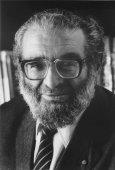 |
Some months
later, he told me that his brother-in-law was the chief of Expeditiones Polaires
Francaise --- the French Polar service. Each year he had to organise an exchange
trip to Dumont D�Urville, the French base in Adelie Land. A ship would come
down from Le Havre in France, carrying aboard it a complete change of scientists
to do the next 12 months down there. It would then take the previous year�s
scientists back to France. With two complete parties down there, a problem
existed in that, while the French Army had nothing to do with the operation,
under their law it was compulsory that they have two medical officers on the
Base in case of any medical drama. It had always been their practice to fly a
second doctor out to cover the two weeks when the numbers were up. Grisha was a
very pragmatic character and between he and his brother-in-law they hatched up a
scheme to find an Australian who�d like a nice cold holiday.
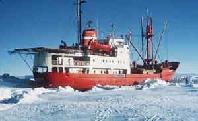 |
No pay, of
course, but they would provide necessary equipment and to take care of the legal
side of things, would arrange for the doctor to be appointed Ship�s Surgeon to
the Danish vessel M.V Thala Dan at a salary of 10 francs. All of this was before
the days of video cameras so I took the advice of an RAAF friend of mine who
told me to take a good 8 mm movie camera with me and keep it inside my outer
clothing to stop the works from seizing up. This I did of course, and ran off
reel after reel of film. (Twenty years later after we came to Queensland to
live, I had it all put on to video tape and every now and then, sneak a look at
it.)
|
The
Antarctic is the most photogenic place, what with the penguins, the albatrosses,
the seals, the icebergs and so forth. Lila became quite fascinated by it and we
had thought of taking the (very expensive) one day sightseeing flight from
Christchurch however it was very soon after that Air New Zealand crashed a 747
into Mount Erebos killing all aboard. Sudden change of plan!!
|
Forward
about five years when I was about to make an overseas visit with Lila coming
along too (she used to enjoy the view from the sharp end of the aircraft!). One
of the chores that I had to do was present a paper on Chemical Causes of Cancer,
to be delivered in the beautiful Finlandia Hall in Helsinki. I agreed to do this
on condition that we could then travel to the very north of Finland, above the
Arctic Circle. The organisers agreed so after I�d sung my song in Helsinki, we
flew for two hours up to the very northernmost area of Finland. Not a penguin to
be seen, of course, because they don�t occur in northern Polar regions. A nice
way to spend a long weekend.
|
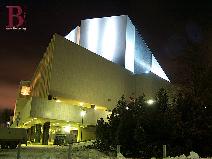 |
For the
first twelve years of my retirement, ICI (UK) maintained me under contract to
study and deal with certain toxicological problems in Polynesia the arrangement
was delightfully vague in that I was required to visit Samoa, Tonga. New
Zealand, Fiji, Tahiti and PNG at least once each year as appeared necessary to
me. As mentioned, it didn�t take long for me to drop PNG from the list as I
didn�t appreciate the change in the behaviour of many of the indigines.
I soon
figured out a schedule by which I could fit all this into two trips of two weeks
each annually. The highlight of all of this was the visit to Geneva (described
elsewhere).
On my very
last of these excursions, I was accompanied by two very good friends --- both
toxicologists, one Kiwi and one Scot. At the end of our work in Tahiti, I
insisted that we leave Papeete and spend a day on the beautiful island of Moorea
--- surely one of the most beautiful places on the planet. (Lila, Ian and I had
a wonderful holiday at Club Med on Moorea when we were living at Sandringham).
At the end
of 1995, ICI(UK) decided that they would prefer to use a full-time member of
staff on this job rather than an old retired colonial like me. They replaced me
with an Indian medico, quite oblivious to the fact that Polynesians have an
absolute hatred of Indians!!
Great pity
for it to end --- Lila and I had used the loot to visit many parts of Australia
that we wanted to see, such as Cape York Peninsula, Darwin, Perth, the
Kimberley, Central Australia, Kangaroo Island, Monkey
Mia, Tasmania etc.
THE FAMILY GROWS
 While the
years were passing. Lila and I had acquired three daughters. We don�t much
like the expression �daughter in law�, much preferring the Samoan style of
welcoming the wives of sons as �daughters�, in this way we have acquired
three daughters. Peter brought Lynne into the family. We have Graeme to thank
for our daughter Sharon, while Susan (Susie) came aboard courtesy of Ian.
While the
years were passing. Lila and I had acquired three daughters. We don�t much
like the expression �daughter in law�, much preferring the Samoan style of
welcoming the wives of sons as �daughters�, in this way we have acquired
three daughters. Peter brought Lynne into the family. We have Graeme to thank
for our daughter Sharon, while Susan (Susie) came aboard courtesy of Ian.
Junior
members arrived too. We have never forgotten dear little Lee who did not survive
and we shared the sadness of this with Peter and Lynne and with Marie and Ian --
the other grandparents. The desperate anxiety of a few years when Simone battled
with leukaemia --- and won the battle-- brought the family much closer together,
and like us, Marie and Ian Hosking will never forget those days and weeks and
months.
Our other
grandchildren give us much pleasure. Melissa and Kimberley now very much young
ladies while the most recent addition -- Juliette with the big dark eyes, just
like her Mum (Susie) is a charmer. We are so lucky to see them quite frequently.
RETIREMENT
We have now
spent almost twenty years in Hervey Bay and the first sixteen of those were full
of unexpected interest. With our radio operator�s certificates that we
acquired before leaving Melbourne, we threw in our lot with H. Bay Air Sea
Rescue (now Volunteer Marine Rescue).
We were both
accepted as radio operators and before long were allocated our own regular
shifts on the radio ---- Lila on Sunday afternoon while I did the Sunday morning
shift. Depending on the weather, this could be either busy or slack. As needs
changed, the number of radio frequencies increased until we reached a maximum of
8, to say nothing of a phone which could he a damned nuisance.
We enjoyed
the job even when genuine dramas cropped up and lives were or might be at risk
or in extreme cases, lives were lost. We remained on the radio job for 15 years
before deciding to retire from it. But that was not the end -- for a number of
years Lila had been the Squadron Contact Person for Critical Stress Management
and finally was elected Patron of the Squadron. (According to the Constitution
of the unit that makes her the Titular Head of the outfit however it�s not an
arduous task other than laying a wreath on Anzac Day, opening building
extensions, attending commissioning of new rescue boats etc).
In addition,
in many instances of real marine urgency, Lila had the experience of being the
radio operator on duty and handled the situations well.
A few years
after we joined the Squadron, I was elected Commodore (which is simply the
marine equivalent of President). I held that job for three years then became the
Hervey Bay representative on the Central Zone Council of Air Sea Rescue
Queensland (Bundaberg, Round Hill, Gladstone and Hervev Bay). A few years later
I was elected to the State Council of Air Sea Rescue Queensland which, soon
after, changed its name to Volunteer Marine Rescue Queensland. In the fullness
of time I became Vice President and later, President, holding each position for
three years.
Perhaps I
should add here that in any volunteer organization, there is a difficulty
getting people to stand for office so all that one has to do is put his head up
and he�s a cert to be elected. Nevertheless there was some satisfaction ---
not in holding the title but in being involved in regular negotiation with the
Queensland Government and visiting most of the 17 Squadrons dotted around the
coast of the State
For the last
three years, our involvement is restricted to attending the AGM and the
Christmas party except of course, for Madam Patron who attends to her duties as
required.
We retain
our membership in the local sub branch of the RSL but have resisted any
temptation to stand for office. Both of us belong to our respective PROBUS
clubs. The word stands for something like Retired Professional and Business
People but really I think it is POOR RETIRED OLD BUGGERS UNFIT FOR SERVICE.
We have
become real Queenslanders but still enjoy watching Aussie Rules football on the
telly but only when the Brisbane Lions are playing.
We have now
(2002) lived in Hervev Bay for just on 20 years and will soon be regarded as
locals. When we arrived here it was rather like seven little fishing villages
with a population of 8500 it is now quite a big city with a population of 43000.
Times do change !!!

